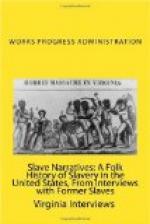“Yes, I was a slave,” she said. “I was born a slave on a plantation in Carroll County, Arkansas and lived there ’till after the war. Law sakes, honey, I can see them ‘Feds’ yet, just as plain as if it was yesterday. We had a long lane—you know what a lane is—well, here they come! I run for mah mammy, and I’ll never forget how she grabbed me and let out a yell, “It’s them Feds, them blue coats.”
“You see my massa was a good massa. He didn’t believe in whipping niggers and he didn’t believe in selling niggers, and so my mammy and me, we didn’t want to leave our mistress and massa. We called them ‘Mother Hulsie’ and ‘Massa Sid.’ One officer told my mammy that she could take along with her, anything out of the cabin that she wanted. Mammy looked around and said, “I don’t want to take nothin’ but my chillun,” so we all told Mother Hulsie ‘goodbye,’ and when my mammy told her goodbye, why Mother Hulsie cried and cried, and said, ’I just can’t let you go, Elizabeth, but go on peacefully, and maybe some day you can come back and see me.’”
As the story came word after word, big tears dropped on the thin black hands, and she reached for her tobacco can and pipe. The can was missing, so I offered to get it for her, for I was anxious for one peep into “Auntie’s” little house, but I couldn’t find the can, so after moans and sighs, she got to her feet and found her favorite Granger Twist. After settling; again in her chair, and when her pipe was at its best, “Auntie” continued, “Oh, honey, it was awful! You see I never been nowhere and I was scairt so I hung onto my mammy. The soldiers took us to camp that night, and after staying there several days, we went on to Springfield, Missouri, and it was right at fifty-two years ago that I came here. I was married to Fuller, my first husband and had seven chilluns. He helped me raise them that lived and, after he died, I married Williams and had two chilluns, but he didn’t help me raise my chilluns. Why, honey, I raised my chilluns and my chilluns’ chilluns, and even one great-grandchild now. Why, I always been a slave. I worked for all the early white families in this here town that needed help.”
I asked “Auntie” if she were ever sold on the block, and she answered, “Law sakes, honey, I must tell you. No, I never was sold, but nuthin’ but the Dear Blessed Lawd saved me. You see Massa Sid had gone away for a few days, and his boys was takin’ care of things, when some nigger traders came and wanted to buy some niggers, and they picked on my grandmammy and me. How old was I? Well, I reckon I was about fourteen. You see, honey, I never could read or write, but I can count, and I can remember—Lawdy! how I can remember. Well, there I was on the block, just scairt and shivering—I was just cold all over—and them there nigger traders was jest a talkin’, when down that long lane came Massa Sid, and I’m tellin’ you, it was the Dear Lawd that sent him. He was a ridin’




